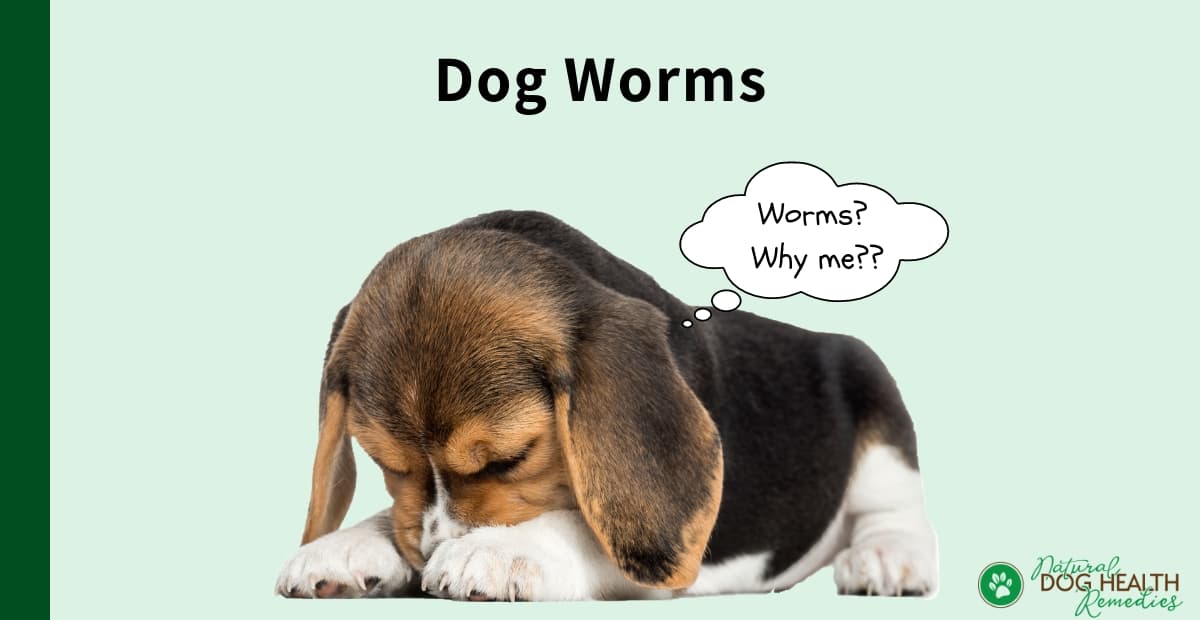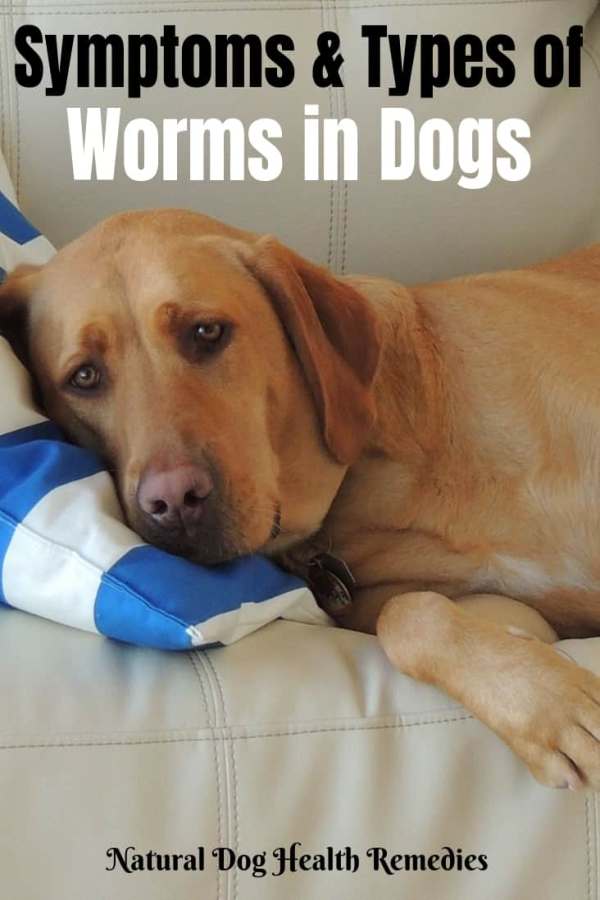Symptoms & Types of Dog Worms

Overview
It may be revolting to think about it, but the truth is, intestinal parasites such as dog worms are more common than we would like to think. They exist even in many healthy adult dogs, though many of such parasites pose relatively little or no harm to the dog hosts.
There are however some species of dog worms that can wreak havoc on dogs - especially on puppies or dogs with compromised immune and digestive systems.
A majority of puppies are infested with intestinal worms when born. As the immune systems of very young pups are not mature and not strong enough to fend off worms and other parasites, they tend to be infested easily.
Other dogs who are more prone to worm infestations include those living in crowded and less desirable conditions, such as rescued dogs.
This page looks at:
- Symptoms of Worms in Dogs
- Common Types of Worms in Dogs
- Treat Dog Worms Holistically
- How to Care for a Dog with Worms
Symptoms of Worms in Dogs
Common symptoms of worms in dogs include digestive problems, such as:
- Diarrhea
- Vomiting
- Gastrointestinal disturbances
As the worms are competing with the dog for nutrients, you will also notice such symptoms as:
- Weight loss
- Stunted growth in puppies
- Anemia
Finally, worms can cause discomfort (e.g. itching) to dogs depending on where they are.
For example, segments of live tapeworms can come out of the dog's gut via the anus. This causes itching to the dog, who will most likely scratch, particularly around the base of his tail, or scoot on the floor.
Larvae of some worms (e.g. hookworms, roundworms) may migrate to the dog's lungs, causing the dog to develop a cough.
Because worms can be transmitted to other pets and in some cases to people, it is recommended to have regular fecal examinations (twice a year) to make sure that our dogs are not infested.
Common Types of Dog Worms
 There are four common types of intestinal worms that infest dogs:
There are four common types of intestinal worms that infest dogs:
Tapeworms
Tapeworms are commonly found in dogs. They can be transmitted by fleas, food sources, or feces.
As revolting as they are, tapeworms do not cause major health problems in dogs.
In fact, we may not even notice that our dog has tapeworms unless our vet has a fecal analysis done. Sometimes, however, we can see body segments of the worms on our dog's feces or on the hair near the anus.
Dogs who are healthy and have strong immune systems are generally not affected adversely by tapeworms. Instead of using strong deworming medicines, milder natural remedies can be used to get rid of these worms.
Visit this page for more information.
Roundworms
Roundworms are the most common type of dog worms. Many puppies get the worms from their mothers and are born with the worms inside.
Roundworms can pose a more serious threat to the health of puppies. In serious cases, they may cause illnesses and even death. It is therefore important to learn more about the symptoms and treatment of this worm.
Visit our page on canine roundworms for more information.
Hookworms
Hookworms are not as common as tapeworms and roundworms but they cannot be overlooked. Hookworms can be transmitted to puppies in the same way as roundworms.
The worms are very small and are difficult to be detected.
Heavy infestation of hookworms poses a serious health problem to puppies since the worms attach to the intestinal walls and suck blood. Again, familiarizing yourself with the symptoms and treatment of this worm is essential.
Access our page on hookworms in dogs for more information.
Whipworms
Whipworms usually affect young adult dogs. Persistent, watery diarrhea is a sign of prolonged infestation, which may cause severe intestinal distress to the dog.
Heavy infestation can also cause anemia.
Read this page for more information about whipworms in dogs.
Holistic Treatment of Dog Worms
With the exception of tapeworms, intestinal worms can cause great distress on our dog's intestinal and immune systems. Therefore, if infestation is confirmed, deworming is recommended.
Consult your vet for an appropriate deworming program. After deworming, milder alternatives, such as herbs or minerals, can be added to our dog's food to keep the intestinal parasites in check.
As mentioned above, tapeworms are generally harmless, and since deworming involves the use of rather strong chemicals which may put additional stress on our dog's body, it is not advisable to use such a program to get rid of tapeworms.
Try the milder herbal and other natural alternatives suggested in our page on tapeworms. They are more gentle on the dog.
Caring for Dogs with Worms
A dog with worm infestations is very often weak due to malnutrition (the worms rob the dog of a lot of essential nutrients) and/or anemia.
It is therefore important to replenish the supply of essential nutrients to strengthen up the dog's immunity.
Nutritious Diet
During and after deworming treatment, it is essential that the dog be fed a highly nutritious diet to replenish the nutrients lost to the worm infestation.
A diet that is high in good-quality animal protein (e.g. meat, fish, eggs) and fat is recommended. Add a bit of olive oil or coconut oil to the dog's food for fat supply.
Heavy infestation of worms such as hookworms also can cause blood loss in dogs, making them anemic. To replenish the all-important iron lost in the blood, the dogs should be fed iron-rich foods, such as raw organic liver, once daily for two to four weeks.
Supplements for Digestion
Even if you feed your dog the best food, it is not going to help him if the food is not properly or fully digested.
A dog with worms usually has a less-than-healthy digestive system. So, to help the dog digest and absorb the food properly, it is advisable to feed him supplements of digestive enzymes and probiotics.
An Effective Dog Worm Remedy
GI CleanUp Gold for Dog Worms
This natural herbal formula contains slippery elm, pumpkin seed, fennel seed, Oregon grape, and more. It is intended for non-acute situations and for use as a general preventative.
Eldredge, et al. Dog Owner's Home Veterinary Handbook 4th edition (Wiley Publishing, 2007).
C.J. Puotinen, Natural Remedies for Dogs and Cats (Keats Publishing, 1999).
M.L. Wulff-Tilford and G.L. Tilford, Herbs for Pets (Bowtie Press, 1999).
R.H. Pitcairn, The Complete Guide to Natural Health for Dogs and Cats (Rodale, 2005).





